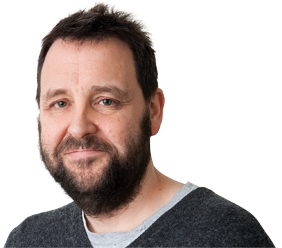And, really, you could probably say that the screen we stare at all day at work is our second one, but let’s just say the second screen is telly. The big question – now that it’s a background medium – is: can it be as successful as radio and stop the internet from stealing its silver medal?
One possible approach is to slow down and embrace slow TV – something we’ve talked about before.
The masters of slow TV are the programme-makers at NRK, the Norwegian national broadcaster. Their greatest hit was to strap a camera to the front of a train embarked on a multi-hour journey into Russia – all broadcast live (but available as a high-definition download).
They have also broadcast a leisurely cruise around the fjords and eight hours of burning logs (which attracted a flood of complaints about their log-stacking technique). They have topped themselves now by announcing the forthcoming National Knitting Night next month.
Is this the future for TV? No. But it’s a future that embraces an aspect of TV that is often ignored – its role as a background, as comfortable wallpaper, as a quiet companion.
That’s something radio has always been fantastic at,but it’s increasingly a contested space. The internet’s very good at that too. My favourite example is at www.youarelistening.to. Pick a city: it will play you some ambient music and the police scanner from that place. It’s quietly hypnotic.
We've assumed the important aspect of exciting, live events has been the exciting bit. Maybe it's just the live bit
We’ve tended to assume that the important aspect of exciting, live events has been the exciting bit.
Maybe it’s just the live bit. Maybe it can be live and slow. As anyone who tuned to the cameras in the stadiums before the Olympics started will tell you, a live camera, even if it’s broadcasting an empty pool, will attract viewers. And the internet turns those viewers into a community.
Maybe, finally, this can be how brands do branded telly. They have often been stymied in the past by the need to do big-budget, high-quality, exciting events. Perhaps they don’t need to bother – they could broadcast the production line or the distribution centre or just the meeting rooms. Maybe I’ll start my own slow TV channel and you can watch me writing this. Perhaps not.
Russell Davies is a creative director at Government Digital Service
@undermanager


